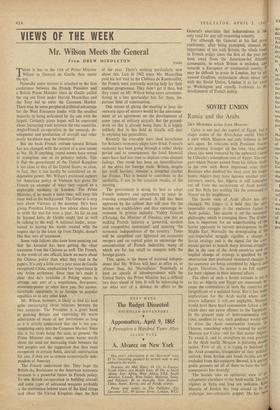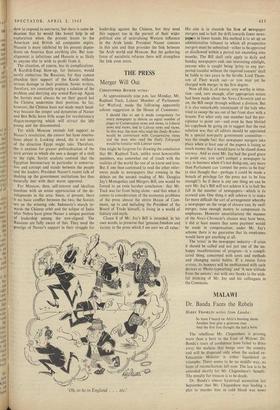DEV MURARKA writes from Moscow:
Cairo is not just the capital of Egypt, but a major centre of the Afro-Asian world. This
a view which Moscow not only believes in but acts upon. Its relations with President Nasser are growing stronger all the time. Any doubti about this were removed by the upheaval caused by Ulbricht's triumphant tour of Egypt. Tilt: sup- port which Nasser gained from his fellow Arabs in his row with Bonn impressed even those Russians who' doubted his sway over his ,ncigh- bours. Algiers may have become another row lutionary centre, but Algeria is still somewhat cut off from the. mainstream of Arab politics and Ben Bella has nothing like the command of Nasser on his neighbours.
The Soviet view, of Arab affairs has also changed. No longer is it held that the anti' imperialist struggle is the exclusive factor in Arab politics. The accent is on' the economic philosophy which is. emerging there. The distinc- tion is important for an understanding of 'the Soviet approach, to current development in ,the Middle East. Normally the downgrading of the anti-imperialist struggle signifies a change in Soviet strategy and is the signal for the cony munist parties to launch sharp internal struggles' But in the case of the Arab countries such art implied change of strategy is qualified by the observation that profound structural changes in the economy are being attempted by Algeria and Egypt. Therefore, the accent is on full support for both rdgimes in their internal affairs. The effect of such a Soviet attitude is nil in so far as Algeria and Egypt are concerned, be' cause the communists in both the countries are insignificant as a political force. But it has wide implications for the Arab world where corn' rnunist influence is still not negligible. MoscoW would have 'these local communists follow aline which does not cause offence to the Egyptians' In the present state of inter-communist rcla' tions, needless to say, such guidance would tend to drive' the Arab communists towards the Chinese, something which is wanted by neithec Moscow nor Cairo - mit for that matter Algicr5' To avoid it, and to strengthen its own position in the Arab world, Moscow is pursuing douhl,e, tactics. First of all, it is trying to befriend In: the Arab countries, irrespective of their politicn' outlook. Even Jordan and Saudi Arabia arc iwt excluded from this category, Second, it is putting, gentle pressure on all of them to treat the loco' communists less severely. The Soviets take an optimistic view of (1°. velopments elsewhere in the Arab world. The nei r6gimes in Syria and Iraq are welcome. Kin! Hussein of Jordan has long ceased to be archetype neo-colonialist puppet. He has been
slow to respond to overtures, but there is some in- dication that he would like Soviet help in oil exploration when the present leases to the American and British oil companies expire.
r Hussein is more inhibited by his present depen- dence on America than anything else. But non- alignment is infectious and Hussein is as likely as anyone else to wish to profit from it.
i/ The situation, of course, has its complications. A Kurdish-Iraqi blow-up, for instance, would surely embarrass the Russians, for they cannot abandon their support of the Kurds without serious damage to their position. Soviet writers, therefore, are constantly urging a solution of the problem and decrying any armed flare-up. Again the Soviets must always be on their guard lest the Chinese undermine their position. So far, however, the Chinese have not made much head- way because the temper and dynamism of Nasser and Ben Bella leave little scope for revolutionary slogan-mongering which will attract the idle Young and the discontented.
Yet while Moscow extends full support to Nasser's revolution, she cannot but have reserva- tions about it. Looking ahead, she is not sure of the direction Egypt might take. Therefore, she is anxious for greater politicalisation of the civil service in which she sees a danger of a shift to the right. Soviet analysts contend that the Egyptian bureaucracy in particular is conserva- tive and corrupt and stands between the people and the leaders. President Nasser's recent talk of shaking up the government institutions has thus
' naturally met with their warm approval.
" For Moscow, then, self-interest and idealism combine with an astute appreciation of the de- velopments in the area. Since, at present, there Is no basic conflict between the two, the Soviets are on the winning side. Indonesia's march to- wards the Chinese orbit and the eclipse of India after Nehru have given Nasser a unique position of leadership among the non-aligned. The Russians are fully aware of this. They need the Prestige of Nasser's support in their struggle for leadership against the Chinese, but they need this support too in the pursuit of their wider political aim of neutralising Western influence in the Arab lands. President Nasser concurs in this aim and thus provides the link between the Arab world and Moscow. But the gathering force of socialistic reforms there will strengthen the link even more.







































 Previous page
Previous page